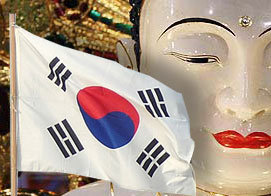Korean President must improve ties with Buddhists
English Donga, AUGUST 13, 2008
Seoul, South Korea -- The Buddhist community’s protest against the government’s "religious discrimination" is stronger than expected. Monks and representatives from Buddhist organizations are fasting and waging a series of demonstrations.
 Also, 27 Buddhist sects and organizations will hold a large-scale demonstration against the government. It is worrying that the discord between the government and Buddhists has worsened despite several apologies from the government.
Also, 27 Buddhist sects and organizations will hold a large-scale demonstration against the government. It is worrying that the discord between the government and Buddhists has worsened despite several apologies from the government.
President Lee Myung-bak is Korea’s third Protestant president, following Rhee Syng-man and Kim Young-sam. His relations with Buddhists, however, are probably the worst for a Korean president.
It was no accident that a Web site on public transportation run by the Land, Transportation and Maritime Affairs Ministry and the geographical information system run by the Education, Science and Technology Ministry have no information on Buddhist temples.
Another incident fueling Buddhist anger was the police search of the official car of the Venerable Jigwan, the chief executive of the Jogye Order, Korea’s largest Buddhist group.
Most of the 24 religious discrimination cases posted on Jogye`s homepage are enough to enrage Buddhists. For example, the former mayor of Pohang promised to spend one percent of his city’s budget to "evangelize" Pohang, but was appointed the head of Central Officials Training Institute in March.
When the election for Seoul’s educational superintendent was held few weeks ago, many churches were used as polling stations. As a result, Jigwan had to visit a church to cast his vote.
Of course, not all of the discrimination cases can be blamed on the government or the president. Undeniably, however, the government has sowed the seeds of discontent. Several of the cases are alleged to have been led by government officials who have struggled to satisfy Lee’s religious preference.
The government and Lee should feel responsible for the discontent of Korean Buddhists. They should not give the impression that Protestants are given preference in personnel choices.
Religious discrimination by the government is against the Constitution and lopsided state policies will be rejected by Koreans. Though Korean society has a variety of religions, it has maintained religious harmony since the government has not discriminated against a certain faith.
Certain lawmakers of the ruling Grand National Party say laws should prohibit religious bias. But this is not about laws, this is about the mindset and attitude of public officials. A considerate government and public officials should know how to separate religion from work. President Lee can only make things better if he strives to ease tension between the government and Buddhists.

 Also, 27 Buddhist sects and organizations will hold a large-scale demonstration against the government. It is worrying that the discord between the government and Buddhists has worsened despite several apologies from the government.
Also, 27 Buddhist sects and organizations will hold a large-scale demonstration against the government. It is worrying that the discord between the government and Buddhists has worsened despite several apologies from the government.